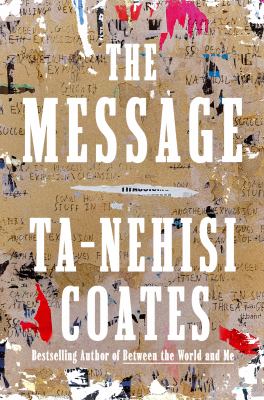
The Message
The renowned author of Between the World and Me journeys to three resonant sites of conflict to explore how the stories we tell—and the ones we don’t—shape our realities.
New Canaan Library
151 Main Street
New Canaan, CT 06840
United States

The renowned author of Between the World and Me journeys to three resonant sites of conflict to explore how the stories we tell—and the ones we don’t—shape our realities.
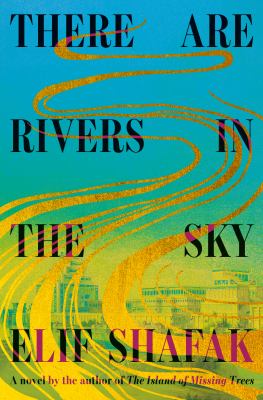
From the Booker Prize finalist, author of The Island of Missing Trees, an enchanting new tale about three characters living along two great rivers, all connected by a single drop of water.
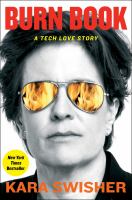
From award-winning journalist Kara Swisher comes a witty, scathing, but fair accounting of the tech industry and its founders who wanted to change the world but broke it instead. "Swisher, the bad-ass journalist and OG chronicler of Silicon Valley...takes no prisoners in this highly readable look at the evolution of the digital world...Bawdy, brash, and compulsively thought-provoking, just like its author, Burn Book sizzles" ( Booklist , starred review).
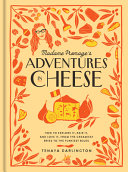
"Cheese expert and writer Tenaya Darlington (aka Madame Fromage) offers a complete-and completely fun-illustrated education in all things cheese: how it's made, how to serve and pair it, how to talk cheese like a pro, the 25 must-try cheeses for your bucket list, and much more. In Madame Fromage's Adventures in Cheese, cheese expert and writer Tenaya Darlington (aka Madame Fromage) guides us through the fascinating and often confusing world of cheeses in a compulsively readable, comprehensive illustrated primer-one that has a sense of humor, and that knows its stuff but feels not at all stuffy. Voice-y, approachable, and fun, the book offers an engaging, lighthearted education in all things cheese. Part 1 (Discover) covers the basics, from "Madame Fromage's Template for a Great Cheese Board" to "All About Milk." Part 2 (Explore) is packed with cheese board "itineraries" that focus on a particular style or family, emphasizing taste and texture rather than provenance (think "stinky" or "fresh" cheeses rather than "from the Loire Valley"). Madame Fromage offers an overview of the style family and how it's made, seasonal information, buying tips, maker profiles, surprising pairing suggestions, and much more. Part 3 (Entertain) has shopping, sharing, and serving tips for the eager gatherer and dinner-party thrower, as well as how to taste cheese like a pro (that is, using the "Yoga Breath of Cheese" technique). Finally, in Part 4 (Keep Learning), we're given an atlas of all things lactic: festivals, reading lists, classes, knives and tools, and even "Twenty Wild Cheeses to Explore Around the World." Rounded out with a Dairy Dossier--an at-a-glance reference to the hundreds of cheeses mentioned throughout--this opinionated and beautifully illustrated book will be the perfect gift for every cheese lover"--
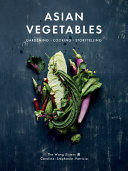
While bok choy is now a staple on Western grocery store shelves, other Asian vegetables remain unknown--even though they're delicious, nutritious, and easy to grow in northern climates.
Caroline, Stéphanie, and Patricia Wang, three sisters of Cantonese descent, have made it their mission to introduce gardeners, cooks, and vegetable lovers of all flavours to wider sources of sustenance.
Organized around fifteen Asian vegetables that are presented according to the rhythm of the seasons, this lush, full-colour book offers advice on growing and harvesting organic crops intended for both weekend and commercial gardeners, along with a host of ideas to preserve and prepare them, including over forty recipes, some of which have been developed by renowned chefs.
The Wang sisters complement the book's practical advice by offering thoughts on Asian vegetables from a cultural point of view and sharing the importance of these foods within their own family, members of whom left China to immigrate to Madagascar before settling in Canada.
Asian Vegetables is a generous and gorgeous tribute to good food, to the land, and the importance of strong roots.
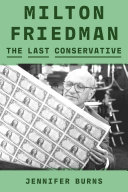
One of The New York Times's 33 Nonfiction Books to Read This Fall | Named a most anticipated fall book by the Chicago Tribune and Bloomberg
The first full biography of America’s most renowned economist.
Milton Friedman was, alongside John Maynard Keynes, the most influential economist of the twentieth century. His work was instrumental in the turn toward free markets that defined the 1980s, and his full-throated defenses of capitalism and freedom resonated with audiences around the world. It’s no wonder the last decades of the twentieth century have been called “the Age of Friedman”—or that analysts have sought to hold him responsible for both the rising prosperity and the social ills of recent times.
In Milton Friedman, the first full biography to employ archival sources, the historian Jennifer Burns tells Friedman’s extraordinary story with the nuance it deserves. She provides lucid and lively context for his groundbreaking work on everything from why dentists earn less than doctors, to the vital importance of the money supply, to inflation and the limits of government planning and stimulus. She traces Friedman’s longstanding collaborations with women, including the economist Anna Schwartz, as well as his complex relationships with powerful figures such as Fed Chair Arthur Burns and Treasury Secretary George Shultz, and his direct interventions in policymaking at the highest levels. Most of all, Burns explores Friedman’s key role in creating a new economic vision and a modern American conservatism. The result is a revelatory biography of America’s first neoliberal—and perhaps its last great conservative.
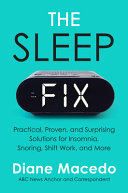
From renowned ABC News anchor/correspondent and former insomniac Diane Macedo, comes a practical, user-friendly guide to getting better sleep. The Sleep Fix flips the switch on common advice, illuminating the reporter's relentless search for how to get a good night's sleep and the surprising, scientific, and practical solutions she found along the way.
Roughly thirty percent of the population is estimated to be living with insomnia, while many more unknowingly suffer from other sleep disorders. In The Sleep Fix, Macedo aims to change that with perspective-shifting research and easy-to-implement solutions based not just on science and experts, but also her own years-long struggle.
As an early-morning reporter and overnight news anchor, Macedo learned the hard way how valuable sleep is, and how it affects everything from our heart to our brain to our immune system. The longer Macedo struggled, the more her health deteriorated. Desperate, she tried standard sleep tip after standard sleep tip, but nothing worked - instead, it made her worse.
Finally, after developing a tolerance to sleeping pills, Macedo decided to attack the problem as a journalist, interviewing sleep experts from all over the world to get to the bottom of what really keeps us from sleeping--and the various ways to fix it.
As Macedo explains, the solution to catching zzz's isn't as simple as giving up caffeine, or putting away your phone before bed. With her down-to-earth explanations and humor, she instead teaches us how to:
* Understand sleep biology
* Identify sleep obstacles
* Flag sleep myths and separate fact from fiction
* Try counterintuitive approaches
* Shift our mindset
Most importantly, Macedo -- a busy, working mom -- teaches us how to adjust and fit these solutions into our everyday lives. Offering expert wisdom, cutting-edge research, intimate sleep stories from public figures, and actionable advice, The Sleep Fix is the tell-it-like-it-is guide this sleep-deprived world has been waiting for.
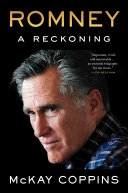
NEW YORK TIMES BESTSELLER! A remarkably illuminating biography of one of America’s most fascinating political figures—including news-making revelations from Mitt Romney himself about dissension within today’s Republican Party—written with his full cooperation by an award-winning writer at The Atlantic.
Few figures in American politics have seen more and said less than Mitt Romney. An outspoken dissident in Donald Trump’s GOP, he has made headlines in recent years for standing alone against the forces he believes are poisoning the party he once led. Romney was the first senator in history to vote to remove from office a president of his own party. When that president’s supporters went on to storm the US Capitol, Romney delivered a thundering speech from the Senate floor accusing his fellow Republicans of stoking insurrection. Despite these moments of public courage, Romney has shared very little about what he’s witnessed behind the scenes over his three decades in politics—in GOP cloakrooms and caucus lunches, in his private meetings with Donald Trump and his family, in his dealings with John McCain, George W. Bush, Barack Obama, Joe Biden, Mitch McConnell, Joe Manchin, and Kyrsten Sinema. Now, exclusively for this biography, Romney has provided a window to his most private thoughts.
Based on dozens of interviews with Romney, his family, and his inner circle as well as hundreds of pages of his personal journals and private emails, this in-depth portrait by award-winning journalist McKay Coppins shows a public servant authentically wrestling with the choices he has made over his career. In lively, revelatory detail, the book traces Romney’s early life and rise through the ranks of a fast-transforming Republican Party and exposes how a trail of seemingly small compromises by political leaders has led to a crisis in democracy. Ultimately, Romney: A Reckoning is a redemptive story about a flawed politician who summoned his moral courage just as fear and divisiveness were overtaking American life.
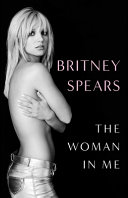
“In Britney Spears’s memoir, she’s stronger than ever.” —The New York Times
The Woman in Me is a brave and astonishingly moving story about freedom, fame, motherhood, survival, faith, and hope.
In June 2021, the whole world was listening as Britney Spears spoke in open court. The impact of sharing her voice—her truth—was undeniable, and it changed the course of her life and the lives of countless others. The Woman in Me reveals for the first time her incredible journey—and the strength at the core of one of the greatest performers in pop music history.
Written with remarkable candor and humor, Spears’s groundbreaking book illuminates the enduring power of music and love—and the importance of a woman telling her own story, on her own terms, at last.
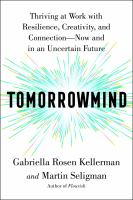
Thrive in your career with this radical, future-proofed approach to work in a world where automation, globalization, and downsizing are an urgent and threatening reality—from experts in workplace mental health, Gabriella Kellerman, CPO of BetterUp, and world-renowned psychologist Martin Seligman.
In recent years, workplace toxicity, industry volatility, and technology-driven turnover have threatened the psychological well-being of employees. When we can’t flourish at work, both personal success and corporate productivity suffer. As we sit on the cusp of some of the most turbulent economic changes in history, many of us wonder how we can not only survive but flourish in our careers.
Now, Tomorrowmind provides essential plans and actionable advice for facing the uncertain future of work. With in-depth and clear-eyed evidence, it offers key skills on everything from resilience and innovation to social connection and foresight. Cultivate a workplace that fosters connection and meaning for yourself or your employees with this timely and crucial guide that is destined to inspire generations of workers.
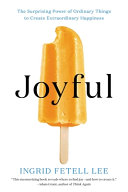
Next Big Idea Club selection -- chosen by Malcolm Gladwell, Susan Cain, Dan Pink, and Adam Grant as one of the "two most groundbreaking new nonfiction reads of the season!"
Inc's "10 Most Inspiring Books of 2018"Real Simple's "Best Books of 2018"Elle's "29 Best Books of 2018" TechCrunch's "Favorite Things of 2018"
"This book has the power to change everything! Writing with depth, wit, and insight, Ingrid Fetell Lee shares all you need to know in order to create external environments that give rise to inner joy."--Susan Cain, author of Quiet and founder of Quiet Revolution
Designer and TED star Ingrid Fetell Lee presents groundbreaking research to explain how making small changes to your surroundings can create extraordinary happiness in your life.
Have you ever wondered why we stop to watch the orange glow that arrives before sunset, or why we flock to see cherry blossoms bloom in spring? Is there a reason that people -- regardless of gender, age, culture, or ethnicity -- are mesmerized by baby animals, and can't help but smile when they see a burst of confetti or a cluster of colorful balloons.
We are often made to feel that the physical world has little or no impact on our inner joy. Increasingly, experts urge us to find balance and calm by looking inward -- through mindfulness or meditation -- and muting the outside world. But what if the natural vibrancy of our surroundings is actually our most renewable and easily accessible source of joy?
In Joyful, designer Ingrid Fetell Lee explores how the seemingly mundane spaces and objects we interact with every day have surprising and powerful effects on our mood. Drawing on insights from neuroscience and psychology, she explains why one setting makes us feel anxious or competitive, while another fosters acceptance and delight -- and, most importantly, she reveals how we can harness the power of our surroundings to live fuller, healthier, and truly joyful lives.
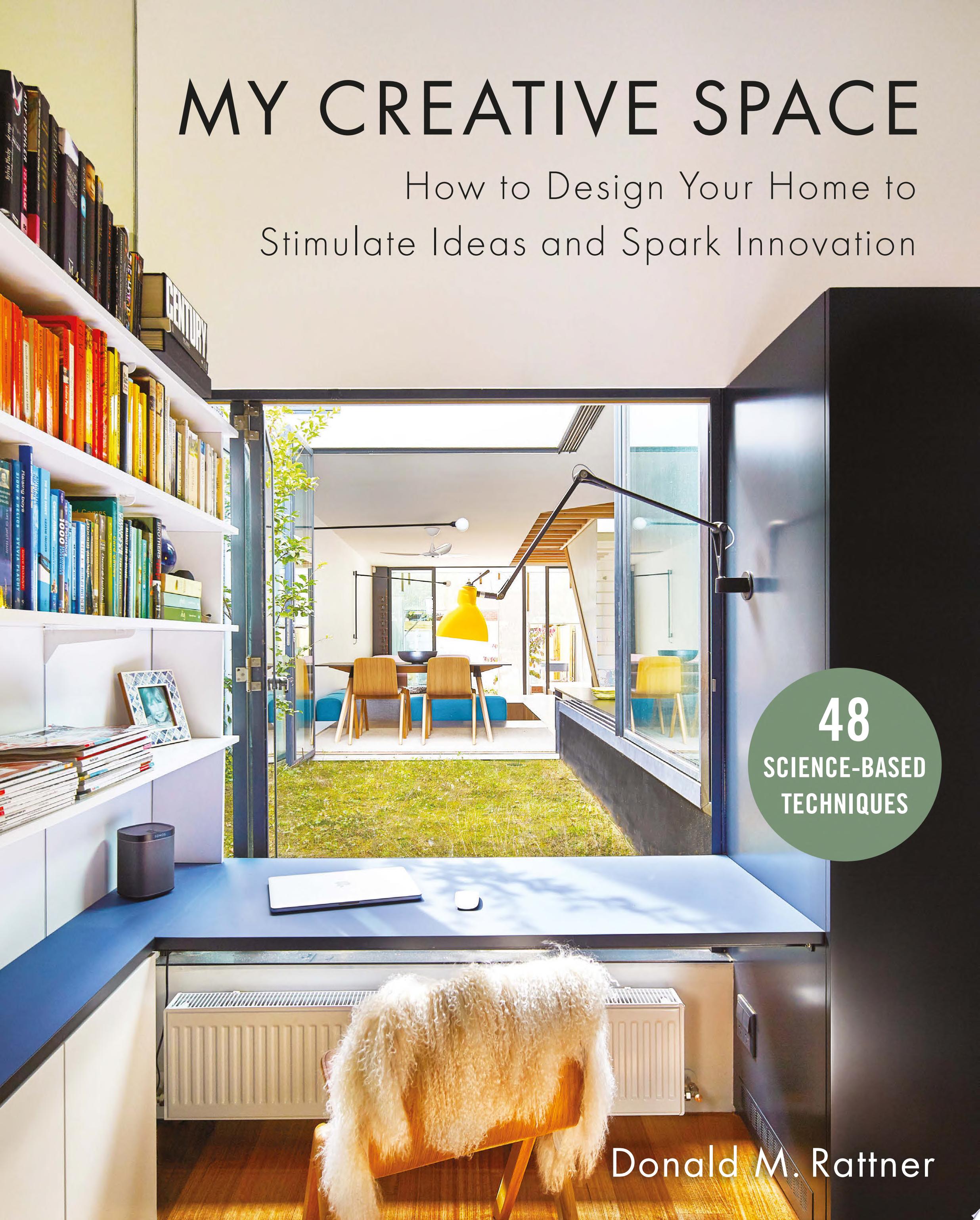
48 Techniques to Boost Your Creativity at Home, According to Science
Creativity isn’t all in your head. Sometimes it’s in what's around you—especially when you’re at home.
For over twenty years, scientists have been discovering connections between our physical surroundings and the creative mind. Written by a noted architect, My Creative Space is the first book to turn this rich trove of psychological research into practical techniques for shaping a home that will boost your creativity.
Here’s a sampling of the techniques you’ll learn about:
Illustrating the book's 48 techniques are over 200 high-quality photos of interiors from around the world, many the work of top-tier architects, designers, and creatives.
Whether you pursue creativity for pleasure or profit, whether you’re a writer, entrepreneur, work in a creative industry, or simply enjoy doing creative things, this book will help you do them better. No prior expertise in design psychology required!
*Winner, 2019 Gold Medal Award, Nonfiction Authors Association
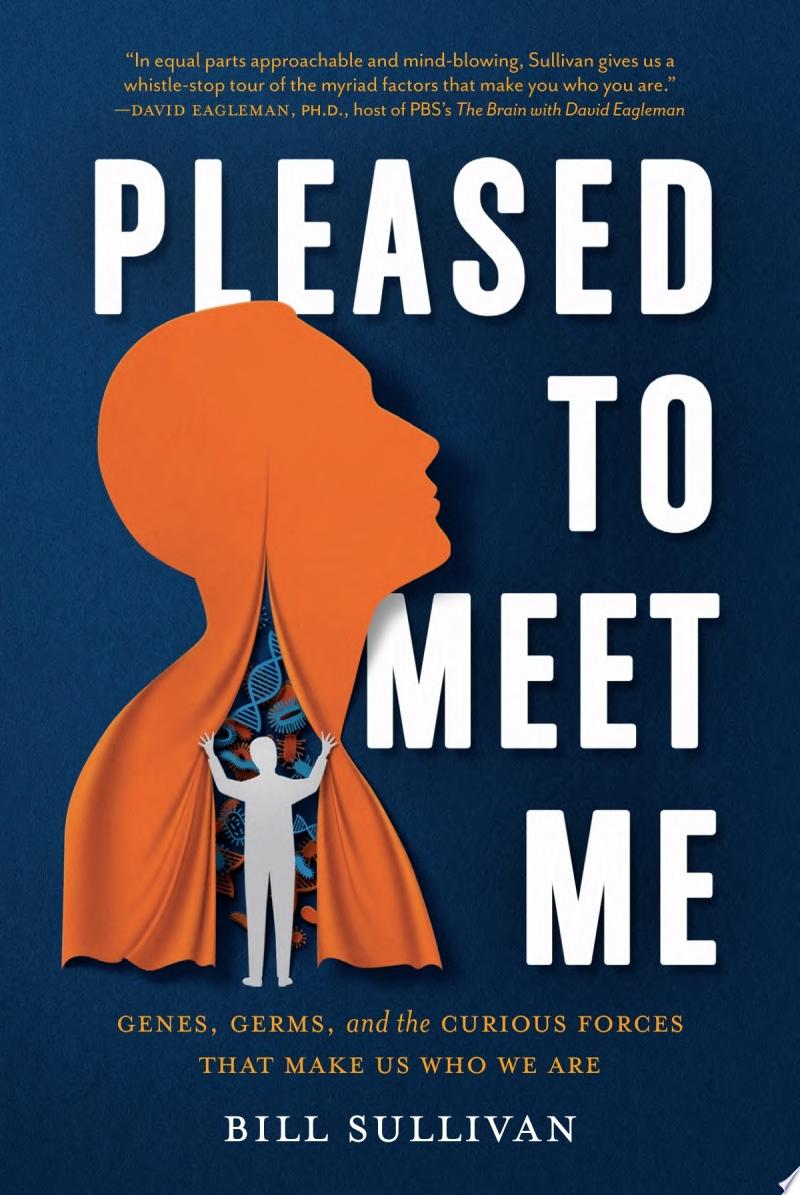
"Why are you attracted to a certain type? Why do you vote the way you do? Why do you struggle to let certain things go? Philosophers and theologians have grappled with the mystery of human behavior for centuries--but now, science is revealing startling new insights into what makes us tick. This provocative narrative from Indiana University School of Medicine professor Bill Sullivan explores our behavior through. the lens of genetics, microbiology, psychology, neurology, and family history, revealing the hidden forces that drive our individual natures. A fascinating tour of the factors that shape our actions, moods, tastes, political beliefs, and more, [this book] unveils a surprising truth: that many of our most defining traits emerge from things we can't control, including our genes, our early environment, our evolutionary past, and the microbes that dwell inside us. In these pages, you'll learn the real reasons we struggle with infidelity, weight loss, drugs, and depression; discover the biological differences that may separate liberals and conservatives; discern the forces that shape human attraction; and comprehend your own impulse to extend a helping hand or throw a punch. These trail-blazing insights are sprinkled with pop culture references that elucidate the scientific imperatives behind them. Filled with revolutionary observations, this eye-opening book takes us on a riveting journey that reveals who we are--and how we can become our best selves."--Dust jacket.
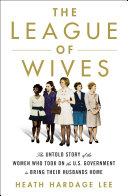
"With astonishing verve, The League of Wives persisted to speak truth to power to bring their POW/MIA husbands home from Vietnam. And with astonishing verve, Heath Hardage Lee has chronicled their little-known story — a profile of courage that spotlights 1960s-era military wives who forge secret codes with bravery, chutzpah and style. Honestly, I couldn’t put it down."
— Beth Macy, author of Dopesick and Factory Man
"Exhilarating and inspiring."
— Elaine Showalter, Washington Post
The true story of the fierce band of women who battled Washington—and Hanoi—to bring their husbands home from the jungles of Vietnam.
On February 12, 1973, one hundred and sixteen men who, just six years earlier, had been high flying Navy and Air Force pilots, shuffled, limped, or were carried off a huge military transport plane at Clark Air Base in the Philippines. These American servicemen had endured years of brutal torture, kept shackled and starving in solitary confinement, in rat-infested, mosquito-laden prisons, the worst of which was The Hanoi Hilton.
Months later, the first Vietnam POWs to return home would learn that their rescuers were their wives, a group of women that included Jane Denton, Sybil Stockdale, Louise Mulligan, Andrea Rander, Phyllis Galanti, and Helene Knapp. These women, who formed The National League of Families, would never have called themselves “feminists,” but they had become the POW and MIAs most fervent advocates, going to extraordinary lengths to facilitate their husbands’ freedom—and to account for missing military men—by relentlessly lobbying government leaders, conducting a savvy media campaign, conducting covert meetings with antiwar activists, and most astonishingly, helping to code secret letters to their imprisoned husbands.
In a page-turning work of narrative non-fiction, Heath Hardage Lee tells the story of these remarkable women for the first time. The League of Wives is certain to be on everyone’s must-read list.
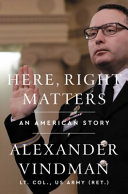
Instant New York Times bestseller
Retired U.S. Army Lieutenant Colonel Alexander Vindman, who found himself at the center of a firestorm for his decision to report the infamous phone call that led to presidential impeachment, tells his own story for the first time. Here, Right Matters is a stirring account of Vindman's childhood as an immigrant growing up in New York City, his career in service of his new home on the battlefield and at the White House, and the decisions leading up to, and fallout surrounding, his exposure of President Trump's abuse of power.
0900, Thursday, July 25, 2019: President Trump called Ukraine's President Zelensky, supposedly to congratulate him on his recent victory. In the months that followed, the American public would only learn what happened on that call because Alexander Vindman felt duty-bound to report it up the chain of command: that the President of the United States had extorted a foreign ally to damage a political challenger at home. Vindman's actions and subsequent testimony before congress would lead to Trump's impeachment and affirm Vindman's belief that he had done the right thing in the face of intense pressure to stay silent. But it would come at an enormous cost, straining relationships with colleagues, superiors, and even his own father, and eventually end his decorated career in the US Army, by a Trump administration intent on retribution.
Here, Right Matters is Vindman's proud, passionate, and candid account of his family, his career, and the moment of truth he faced for his nation. As an immigrant, raised by a father who fled the Soviet Union in pursuit of a better life for his children, Vindman learned about respect for truth throughout his education and military service. As this memoir makes clear, his decision to speak up about the July 25th call was never a choice: it was Vindman's duty, as a naturalized citizen and member of the armed forces. In the wake of his testimony, he would endure furious partisan attacks on his record and his loyalty. But far louder was the extraordinary chorus of support from citizens who were collectively intent on reaffirming an abiding American commitment to integrity.
In the face of a sure-fire career derailment and public excoriation, Vindman heeded the lessons from the people and institutions who instilled in him the moral compass and the courage to act decisively. Like so many other American immigrant families, the Vindmans had to learn to build a life from scratch and take big risks to achieve important goals. Here, Right Matters is about the quiet heroes who keep us safe; but, above all, it is a call to arms for those who refuse to let America betray its true self.
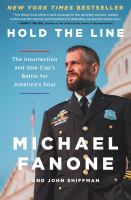
From a twenty-year police veteran and former Trump supporter who nearly lost his life during the insurrection of January 6th, this instant New York Times bestseller is also an urgent warning that “offers a stark message for this uncertain moment, making crystal clear the urgency and importance of defending our precious democracy” (Nancy Pelosi).
When Michael Fanone self-deployed to the Capitol on January 6, 2021, he had no idea his life was about to change. When he got to the front of the line, he urged his fellow officers to hold it against the growing crowd of insurrectionists—until he found himself pulled into the mob, tased until he had a heart attack, and viciously beaten with a Blue Lives Matter flag as shouts to kill him rang out.
Now, Fanone is ready to tell the full story of that infamous day, along with exploring our country’s most critical issues as someone who has had firsthand experience with many of them. A self-described redneck who voted for Trump in 2016, Fanone’s closest friend was an informant—a Black, transgender, HIV-positive woman who has helped him mature and rethink his methods as a police officer. With his unique insight as an undercover detective and intense desire to do the right thing no matter the cost, Fanone provides a nuanced look into everything from policing to race to politics in a way that is accessible across all party lines.
Determined to make sure no one forgets what happened at the Capitol on January 6th, Fanone has written a timely and “important” (Kirkus Reviews) call to action for anyone who wants to preserve our democracy for future generations.
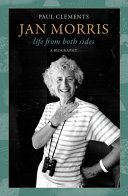
"No matter what topic Morris covered over the course of her nearly eight-decade career--from travel to history to her own transition--she did so with insight, elegance and unflinching honesty." --Stuart Emmrich, Vogue
The first ever biography of a world famous author and transgender pioneer.
When Jan Morris passed away in 2020, she was considered one of Britain's best-loved writers. The author of Venice, Pax Britannica, Conundrum, and more than fifty other books, her work was known for its observational genius, lyricism, and humor, and had earned her a passionate readership around the world.
Morris's life was no less fascinating than her oeuvre. Born James Humphry Morris in 1926, a childhood spent amidst Oxford's Gothic beauty and military service in Italy and the Middle East were followed by a career as an internationally feted foreign correspondent. From being the only journalist to join the first ascent of Mount Everest in 1953 to covering the trial of Adolf Eichmann, Morris's reportage spanned many of the twentieth century's defining moments.
However, public success masked a private dilemma that was only resolved when she transitioned genders in the late 1960s, becoming renowned as a transgender pioneer. She went on to live happily with her wife Elizabeth in Wales for another five decades, and never stopped writing and publishing.
Here, for the first time, the many strands of Morris's rich life are brought together, portraying a person of extraordinary talent, curiosity, and joie de vivre.
Paul Clements is the author of five travel books on Ireland. He knew Jan Morris personally for thirty years.
"Perhaps the greatest travel writer of her time." --Matt Schudel, Washington Post
"To open a book by Jan Morris is like popping the cork on a bottle of champagne: pop, fizz, then bubbles of delight." --Scott Simon, NPR
"Distinctive, elegant, formidable ... Morris made travel seem like the best way to truly be alive in one's skin." --Dwight Garner, New York Times
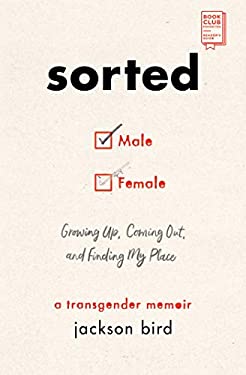
An unflinching and endearing memoir from LGBTQ+ advocate Jackson Bird about how, through a childhood of gender mishaps and an awkward adolescence, he finally sorted things out and came out as a transgender man in his mid-twenties.
When Jackson Bird was twenty-five, he came out as a transgender to his friends, family, and anyone in the world with an internet connection. Assigned female at birth and raised as a girl, he often wondered if he should have been born a boy. Jackson didn’t share this thought with anyone because he didn’t think he could share it with anyone. Growing up in Texas in the 1990s, he had no transgender role models. He barely remembers meeting anyone who was openly gay, let alone being taught that transgender people existed outside of punchlines.
In this “soulful and heartfelt coming-of-age story” (Jamia Wilson, director and publisher of the Feminist Press), Jackson chronicles the ups and downs of growing up gender confused. Illuminated by journal entries spanning childhood to adolescence to today, he candidly recalls the challenges and loneliness he endured as he came to terms with both his gender and his bisexual identity. With warmth and wit, Jackson also recounts how he navigated the many obstacles and quirks of his transition––like figuring out how to have a chest binder delivered to his NYU dorm room and having an emotional breakdown at a Harry Potter fan convention. From his first shot of testosterone to his eventual top surgery, Jackson lets you in on every part of his journey—taking the time to explain trans terminology and little-known facts about gender and identity along the way. “A compassionate, tender-hearted, and accessible book for anyone who might need a hand to hold as they walk through their own transition or the transition of a loved one” (Austin Chant, author of Peter Darling), Sorted demonstrates the power and beauty in being yourself, even when you’re not sure who “yourself” is.
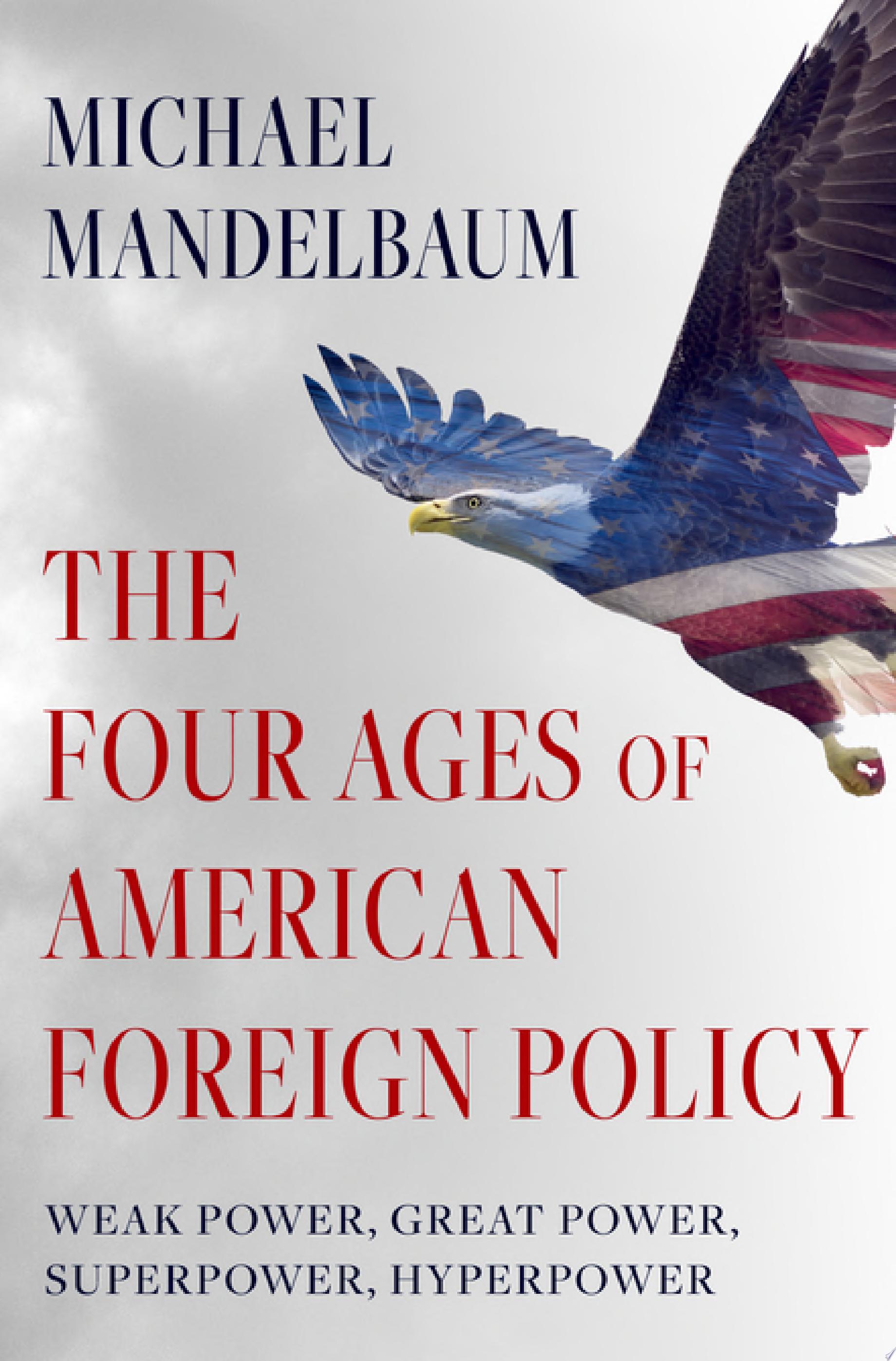
A new and unique framework for understanding the history of the foreign policy of the United States.
The United States is now nearly 250 years old. It arose from humble beginnings, as a strip of mostly agrarian and sparsely populated English colonies on the northeastern edge of the New World, far removed from the centers of power in Europe. Today, it is the world's most powerful country, with its largest economy and most powerful military. How did America achieve this status?
In The Four Ages of American Foreign Policy, Michael Mandelbaum offers a new framework for understanding the evolution of the foreign policy of the United States. He divides that evolution into four distinct periods, with each defined by the consistent increase in American power relative to other countries. His history of the four periods features engaging accounts of the major events and important personalities in the foreign policy of each era. Throughout, Mandelbaum highlights fundamental continuities in the goals of American foreign policy and in the way that policy was adopted and implemented. He portrays the United States, in its ascent, first as a weak power, from 1765 to 1865, then as a great power between 1865 and 1945, next as a superpower in the years 1945 to 1990, and finally as the world's sole hyperpower, from 1990 to 2015. He also presents three features of American foreign policy that are found in every era: first, the goal of disseminating the political ideas
Americans have embraced from the first; second, the use of economic instruments in pursuit of the country's foreign policy goals; and third, a process for formulating policy and implementing decisions shaped by considerable popular influence. American foreign policy, as he puts it, has been unusually ideological, unusually economic, and unusually democratic.
A sweeping and elegantly written history, The Four Ages of American Foreign Policy will reshape our understanding of how the United States became the most powerful nation the world has ever seen.
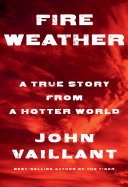
FINALIST FOR THE NATIONAL BOOK AWARD IN NONFICTION • A stunning account of a colossal wildfire that collided with a city, and a panoramic exploration of the rapidly changing relationship between fire and humankind from the award-winning, best-selling author of The Tiger and The Golden Spruce • Finalist for the Baillie Gifford Prize for Non-Fiction
“Grips like a philosophical thriller, warns like a beacon, and shocks to the core." —Robert Macfarlane, bestselling author of Underland
“Riveting, spellbinding, astounding on every page.” —David Wallace-Wells, #1 bestselling author of The Uninhabitable Earth
In May 2016, Fort McMurray, the hub of Canada’s oil industry and America’s biggest foreign supplier, was overrun by wildfire. The multi-billion-dollar disaster melted vehicles, turned entire neighborhoods into firebombs, and drove 88,000 people from their homes in a single afternoon. Through the lens of this apocalyptic conflagration—the wildfire equivalent of Hurricane Katrina—John Vaillant warns that this was not a unique event, but a shocking preview of what we must prepare for in a hotter, more flammable world.
Fire has been a partner in our evolution for hundreds of millennia, shaping culture, civilization, and, very likely, our brains. Fire has enabled us to cook our food, defend and heat our homes, and power the machines that drive our titanic economy. Yet this volatile energy source has always threatened to elude our control, and in our new age of intensifying climate change, we are seeing its destructive power unleashed in previously unimaginable ways.
With masterly prose and a cinematic eye, Vaillant takes us on a riveting journey through the intertwined histories of North America’s oil industry and the birth of climate science, to the unprecedented devastation wrought by modern forest fires, and into lives forever changed by these disasters. John Vaillant’s urgent work is a book for—and from—our new century of fire, which has only just begun.
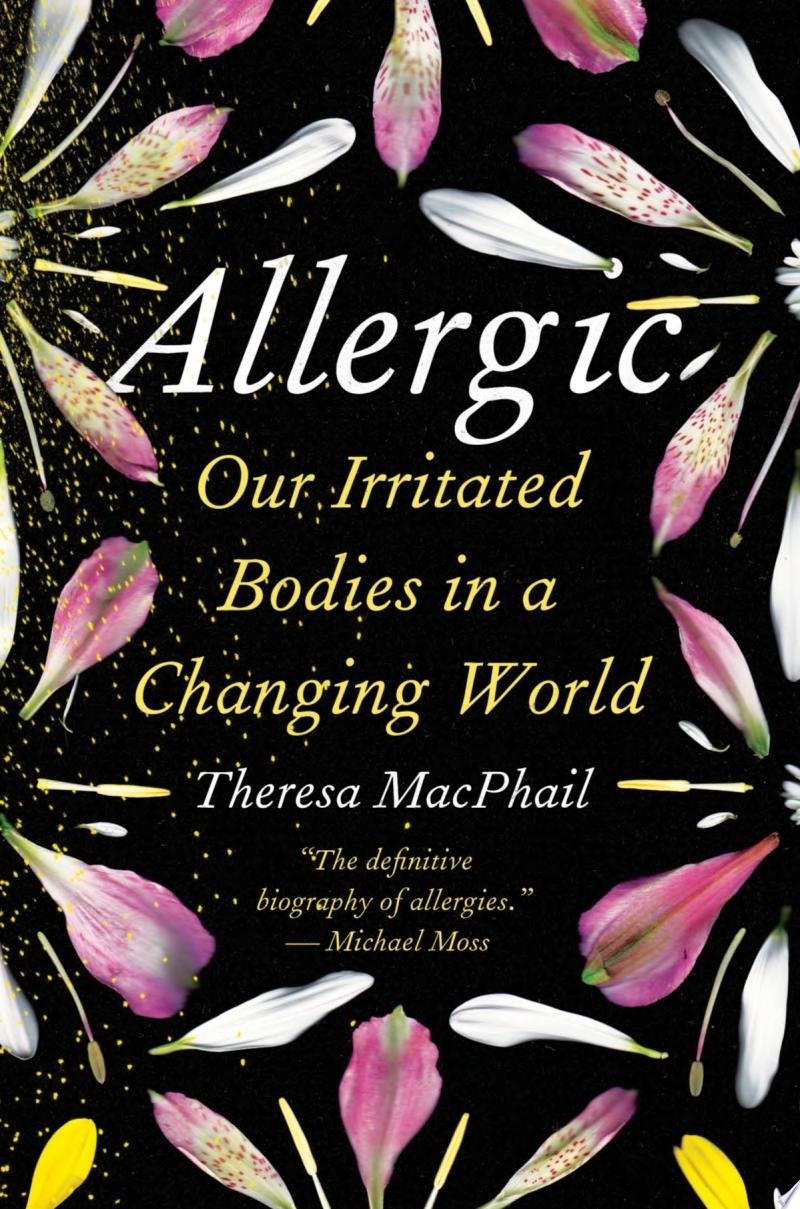
An “important and deeply researched” (The Wall Street Journal) exploration of allergies, from their first medical description in 1819 to the cutting-edge science that is illuminating the changes in our environment and lifestyles that are making so many of us sick
Hay fever. Peanut allergies. Eczema. Either you have an allergy or you know someone who does. Billions of people worldwide—an estimated 30 to 40 percent of the global population—have some form of allergy. Even more concerning, over the last decade the number of people diagnosed with an allergy has been steadily increasing, placing an ever-growing medical burden on individuals, families, communities, and healthcare systems.
Medical anthropologist Theresa MacPhail, herself an allergy sufferer whose father died of a beesting, set out to understand why. In pursuit of answers, MacPhail studied the dangerous experiments of early immunologists as well as the mind-bending recent development of biologics and immunotherapies that are giving the most severely impacted patients hope. She scaled a roof with an air-quality controller who diligently counts pollen by hand for hours every day; met a mother who struggled to use WIC benefits for her daughter with severe food allergies; spoke with doctors at some of the finest allergy clinics in the world; and discussed the intersecting problems of climate change, pollution, and pollen with biologists who study seasonal respiratory allergies.
This is the story of allergies: what they are, why we have them, and what that might mean about the fate of humanity in a rapidly changing world.
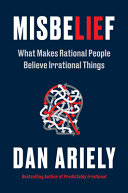
The renowned social scientist, professor, and bestselling author of Predictably Irrational delivers his most urgent and compelling book--an eye-opening exploration of the human side of the misinformation crisis--examining what drives otherwise rational people to adopt deeply irrational beliefs.
Misinformation affects all of us on a daily basis--from social media to larger political challenges, from casual conversations in supermarkets, to even our closest relationships. While we recognize the dangers that misinformation poses, the problem is complex--far beyond what policing social media alone can achieve--and too often our limited solutions are shaped by partisan politics and individual interpretations of truth.
In Misbelief, preeminent social scientist Dan Ariely argues that to understand the irrational appeal of misinformation, we must first understand the behavior of "misbelief"--the psychological and social journey that leads people to mistrust accepted truths, entertain alternative facts, and even embrace full-blown conspiracy theories. Misinformation, it turns out, appeals to something innate in all of us--on the right and the left--and it is only by understanding this psychology that we can blunt its effects. Grounded in years of study as well as Ariely's own experience as a target of disinformation, Misbelief is an eye-opening and comprehensive analysis of the psychological drivers that cause otherwise rational people to adopt deeply irrational beliefs. Utilizing the latest research, Ariely reveals the key elements--emotional, cognitive, personality, and social--that drive people down the funnel of false information and mistrust, showing how under the right circumstances, anyone can become a misbeliever.
Yet Ariely also offers hope. Even as advanced artificial intelligence has become capable of generating convincing fake news stories at an unprecedented scale, he shows that awareness of these forces fueling misbelief make us, as individuals and as a society, more resilient to its allure. Combating misbelief requires a strategy rooted not in conflict, but in empathy. The sooner we recognize that misbelief is above all else a human problem, the sooner we can become the solution ourselves.
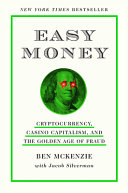
INSTANT NEW YORK TIMES BESTSELLER
LONGLISTED FOR THE FINANCIAL TIMES 2023 BUSINESS BOOK OF THE YEAR
"A smart, savvy road map through the mayhem of the cryptocurrency madness."
--RON CHERNOW, Pulitzer Prize-winning author of Alexander Hamilton
From "one of the crypto industry's unlikely but most prominent critics" (Washington Post), an entertaining and well-researched account of the rise and fall of cryptocurrency.
At the height of the pandemic, TV star Ben McKenzie was the perfect mark for cryptocurrency: a dad stuck at home with some cash in his pocket, worried about his family, armed with only the vague notion that people were making heaps of money on something he--despite a degree in economics--didn't entirely understand. Lured in by grandiose, utopian promises, and sure, a little bit of FOMO, McKenzie dove deep into blockchain, Bitcoin, and the various other coins and exchanges on which they are traded. But after scratching the surface, he had to ask, "Am I crazy, or is this all a total scam?"
In Easy Money, McKenzie enlists the help of journalist Jacob Silverman for an investigative adventure into crypto and its remarkable crash. Weaving together stories of average traders and victims, colorful crypto "visionaries," Hollywood's biggest true believers, anti-crypto whistleblowers, and government operatives, Easy Money is an on-the-ground look at a perfect storm of irresponsibility and criminal fraud. Based on original reporting across the country and abroad, including interviews with Sam Bankman-Fried, Tether cofounder Brock Pierce, Celsius's Alex Mashinsky, and more, this is the book on cryptocurrency you've been waiting for.
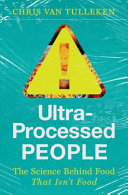
It's not you, it's the food.
We have entered a new age of eating. For the first time in human history, most of our calories come from an entirely novel set of substances called Ultra-Processed Food. There's a long, formal scientific definition, but it can be boiled down to this: if it's wrapped in plastic and has at least one ingredient that you wouldn't find in your kitchen, it's UPF.
These products are specifically engineered to behave as addictive substances, driving excess consumption. They are now linked to the leading cause of early death globally and the number one cause of environmental destruction. Yet almost all our staple foods are ultra-processed. UPF is our food culture and for many people it is the only available and affordable food.
In this book, Chris van Tulleken, father, scientist, doctor, and award-winning BBC broadcaster, marshals the latest evidence to show how governments, scientists, and doctors have allowed transnational food companies to create a pandemic of diet-related disease. The solutions don't lie in willpower, personal responsibility, or exercise. You'll find no diet plan in this book--but join Chris as he undertakes a powerful self-experiment that made headlines around the world: under the supervision of colleagues at University College London he spent a month eating a diet of 80 percent UPF, typical for many children and adults in the United States. While his body became the subject of scientific scrutiny, he spoke to the world's leading experts from academia, agriculture, and--most important--the food industry itself. But more than teaching him about the experience of the food, the diet switched off Chris's own addiction to UPF.
In a fast-paced and eye-opening narrative he explores the origins, science, and economics of UPF to reveal its catastrophic impact on our bodies and the planet. And he proposes real solutions for doctors, for policy makers, and for all of us who have to eat. A book that won't only upend the way you shop and eat, Ultra-Processed People will open your eyes to the need for action on a global scale.
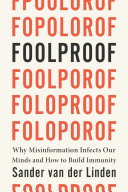
One of the world’s top experts on fighting misinformation reveals the psychology behind its power—and how we can protect ourselves.
From fake news to conspiracy theories, from pandemics to politics, misinformation may be the defining problem of our era. Like a virus, misinformation infects our minds—altering our beliefs and replicating at astonishing rates. Once the virus takes hold, our primary strategies of fact-checking and debunking are an ineffective cure.
In Foolproof, psychologist Sander van der Linden introduces a new paradigm for combatting what the World Health Organization has declared a worldwide “infodemic.” Synthesizing decades of social psychology studies with groundbreaking original research, he explains why our brains are so susceptible to misinformation, how it spreads across social networks, and how we can cultivate immunity. The answer is the innovative science of “prebunking”—inoculating people against misinformation by preemptively exposing them to a weakened dose and teaching them to identify and fend off its manipulative tactics. With engaging case studies and practical strategies for institutions and individuals alike, Foolproof is the definitive book on resisting nefarious persuasion.
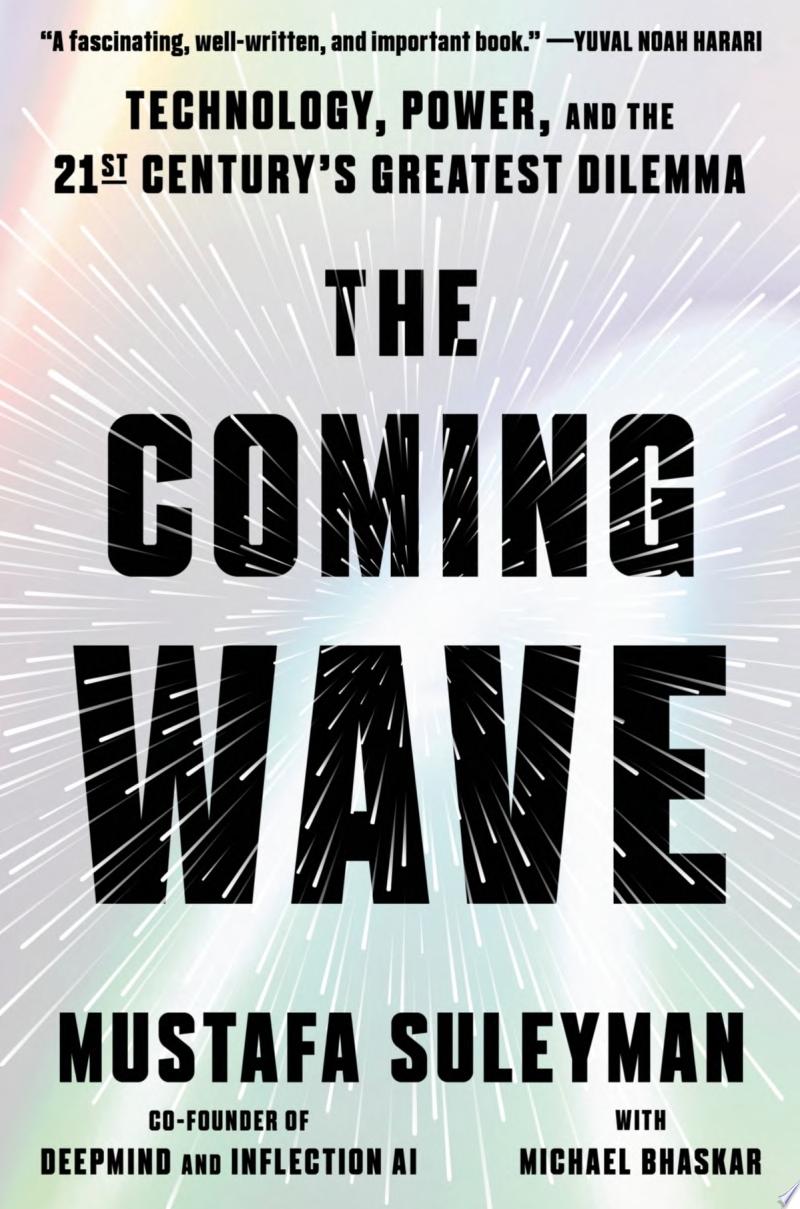
NEW YORK TIMES BESTSELLER • An urgent warning of the unprecedented risks that AI and other fast-developing technologies pose to global order, and how we might contain them while we have the chance—from a co-founder of the pioneering artificial intelligence company DeepMind
“A fascinating, well-written, and important book.”—Yuval Noah Harari
“Essential reading.”—Daniel Kahneman
“An excellent guide for navigating unprecedented times.”—Bill Gates
Finalist for the Financial Times and Schroders Business Book of the Year Award • Longlisted for the Inc. Non-Obvious Book Award
We are approaching a critical threshold in the history of our species. Everything is about to change.
Soon you will live surrounded by AIs. They will organise your life, operate your business, and run core government services. You will live in a world of DNA printers and quantum computers, engineered pathogens and autonomous weapons, robot assistants and abundant energy.
None of us are prepared.
As co-founder of the pioneering AI company DeepMind, part of Google, Mustafa Suleyman has been at the centre of this revolution. The coming decade, he argues, will be defined by this wave of powerful, fast-proliferating new technologies.
In The Coming Wave, Suleyman shows how these forces will create immense prosperity but also threaten the nation-state, the foundation of global order. As our fragile governments sleepwalk into disaster, we face an existential dilemma: unprecedented harms on one side, the threat of overbearing surveillance on the other.
Can we forge a narrow path between catastrophe and dystopia?
This groundbreaking book from the ultimate AI insider establishes “the containment problem”—the task of maintaining control over powerful technologies—as the essential challenge of our age.
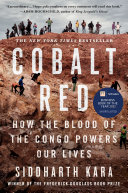
The revelatory New York Times and Publishers Weekly bestseller, shortlisted for the Financial Times Best Business Book of the Year Award.
An unflinching investigation reveals the human rights abuses behind the Congo’s cobalt mining operation—and the moral implications that affect us all.
Cobalt Red is the searing, first-ever exposé of the immense toll taken on the people and environment of the Democratic Republic of the Congo by cobalt mining, as told through the testimonies of the Congolese people themselves. Activist and researcher Siddharth Kara has traveled deep into cobalt territory to document the testimonies of the people living, working, and dying for cobalt. To uncover the truth about brutal mining practices, Kara investigated militia-controlled mining areas, traced the supply chain of child-mined cobalt from toxic pit to consumer-facing tech giants, and gathered shocking testimonies of people who endure immense suffering and even die mining cobalt.
Cobalt is an essential component to every lithium-ion rechargeable battery made today, the batteries that power our smartphones, tablets, laptops, and electric vehicles. Roughly 75 percent of the world’s supply of cobalt is mined in the Congo, often by peasants and children in sub-human conditions. Billions of people in the world cannot conduct their daily lives without participating in a human rights and environmental catastrophe in the Congo. In this stark and crucial book, Kara argues that we must all care about what is happening in the Congo—because we are all implicated.
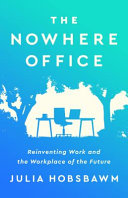
Named one of the Financial Times' BEST BUSINESS BOOKS OF 2022
What has changed in the workplace? Everything.
The traditional office was probably doomed anyway. Then a global shutdown changed everything we thought we knew about work, including where and when it needed to take place. Automation and the Fourth Industrial Revolution have accelerated, and perhaps as much as one third of the world's permanent workforce will soon become remote. In The Nowhere Office, Julia Hobsbawm offers a strategic and practical guide to navigating this pivotal moment in the history of work and provides lessons for how both employees and employers can adapt.
Hobsbawm draws on her extensive networks in business, academia, and entrepreneurship across generations to offer new ideas about how to handle hybrid working, as well as provides deep insight into how the way we work is being transformed by larger issues such as community, hierarchy, bias, identity, and security. The Nowhere Office describes a unique moment in the history of work which, if understood and handled correctly, can provide a springboard for the biggest transformational change in the workplace for a century: something better, more meaningful, and more workable for everyone.
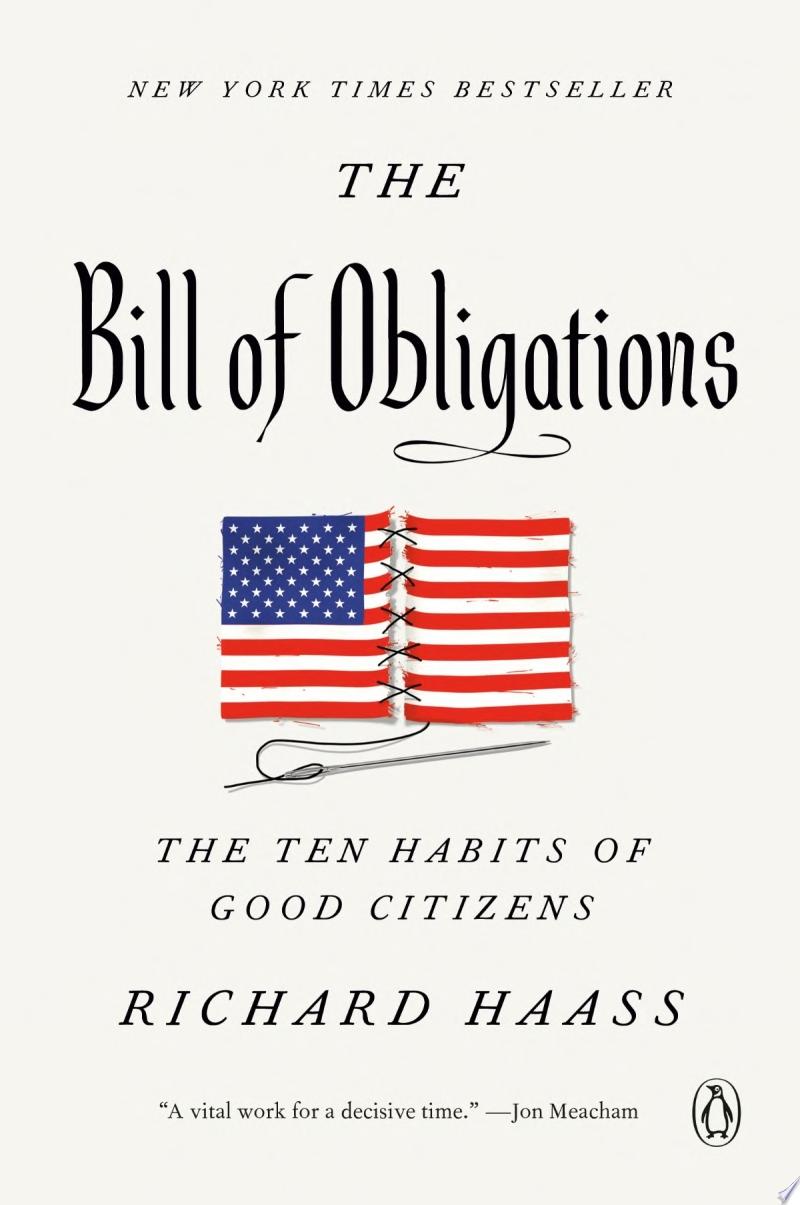
An Instant New York Times Bestseller
A provocative guide to how we must reenvision citizenship if American democracy is to survive
The United States faces dangerous threats from Russia, China, North Korea, Iran, terrorists, climate change, and future pandemics. The greatest peril to the country, however, comes not from abroad but from within, from none other than ourselves. The question facing us is whether we are prepared to do what is necessary to save our democracy.
The Bill of Obligations is a bold call for change. In these pages, New York Times bestselling author Richard Haass argues that the very idea of citizenship must be revised and expanded. The Bill of Rights is at the center of our Constitution, yet our most intractable conflicts often emerge from contrasting views as to what our rights ought to be. As former Supreme Court Justice Stephen Breyer pointed out, “Many of our cases, the most difficult ones, are not about right versus wrong. They are about right versus right.” The lesson is clear: rights alone cannot provide the basis for a functioning, much less flourishing, democracy.
But there is a cure: to place obligations on the same footing as rights. The ten obligations that Haass introduces here are essential for healing our divisions and safeguarding the country’s future. These obligations reenvision what it means to be an American citizen. They are not a burden but rather commitments that we make to fellow citizens and to the government to uphold democracy and counter the growing apathy, anger, selfishness, division, disinformation, and violence that threaten us all. Through an expert blend of civics, history, and political analysis, this book illuminates how Americans can rediscover and recover the attitudes and behaviors that have contributed so much to this country’s success over the centuries.
As Richard Haass argues, “We get the government and the country we deserve. Getting the one we need, however, is up to us.” The Bill of Obligations gives citizens across the political spectrum a plan of action to achieve it.
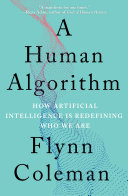
A groundbreaking narrative on the urgency of ethically designed AI and a guidebook to reimagining life in the era of intelligent technology.
The Age of Intelligent Machines is upon us, and we are at a reflection point. The proliferation of fast–moving technologies, including forms of artificial intelligence akin to a new species, will cause us to confront profound questions about ourselves. The era of human intellectual superiority is ending, and we need to plan for this monumental shift.
A Human Algorithm: How Artificial Intelligence Is Redefining Who We Are examines the immense impact intelligent technology will have on humanity. These machines, while challenging our personal beliefs and our socioeconomic world order, also have the potential to transform our health and well–being, alleviate poverty and suffering, and reveal the mysteries of intelligence and consciousness. International human rights attorney Flynn Coleman deftly argues that it is critical that we instill values, ethics, and morals into our robots, algorithms, and other forms of AI. Equally important, we need to develop and implement laws, policies, and oversight mechanisms to protect us from tech’s insidious threats.
To realize AI’s transcendent potential, Coleman advocates for inviting a diverse group of voices to participate in designing our intelligent machines and using our moral imagination to ensure that human rights, empathy, and equity are core principles of emerging technologies. Ultimately, A Human Algorithm is a clarion call for building a more humane future and moving conscientiously into a new frontier of our own design.
“[Coleman] argues that the algorithms of machine learning––if they are instilled with human ethics and values––could bring about a new era of enlightenment.” —San Francisco Chronicle
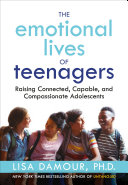
An urgently needed guide to help parents understand their teenagers’ intense and often fraught emotional lives—and how to support them through this critical developmental stage—from the New York Times bestselling author of Untangled and Under Pressure
In teenagers, powerful emotions come with the territory. And with so many of today’s teens contending with academic pressure, social media stress, worries about the future, and concerns about their own mental health, it’s easy for them—and their parents—to feel anxious and overwhelmed. But it doesn’t have to be that way.
Parents who read this book will learn:
• what to expect in the normal course of adolescent emotional development and when it’s time to worry
• why teens (and adults) need to understand that mental health isn’t about “feeling good” but about having feelings that fit the moment, even if those feelings are unwanted or painful
• strategies for supporting teens who feel at the mercy of their emotions so they can become psychologically aware and skilled at managing their feelings
• how to approach common challenges that come with adolescence, such as friction at home, spiking anxiety, risky behavior, navigating friendships and romances, the pull of social media, and many more
• the best ways to stay connected to their teens and how to provide the kind of relationship that adolescents need and want
With clear, research-informed explanations alongside illuminating, real-life examples, The Emotional Lives of Teenagers gives parents the concrete, practical information they need to steady their teens through the bumpy yet transformational journey into adulthood.
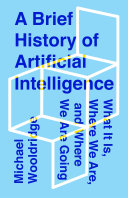
From Oxford's leading AI researcher comes a fun and accessible tour through the history and future of one of the most cutting edge and misunderstood field in science: Artificial Intelligence
The somewhat ill-defined long-term aim of AI is to build machines that are conscious, self-aware, and sentient; machines capable of the kind of intelligent autonomous action that currently only people are capable of. As an AI researcher with 25 years of experience, professor Mike Wooldridge has learned to be obsessively cautious about such claims, while still promoting an intense optimism about the future of the field. There have been genuine scientific breakthroughs that have made AI systems possible in the past decade that the founders of the field would have hailed as miraculous. Driverless cars and automated translation tools are just two examples of AI technologies that have become a practical, everyday reality in the past few years, and which will have a huge impact on our world.
While the dream of conscious machines remains, Professor Wooldridge believes, a distant prospect, the floodgates for AI have opened. Wooldridge's A Brief History of Artificial Intelligence is an exciting romp through the history of this groundbreaking field--a one-stop-shop for AI's past, present, and world-changing future.